The new law On Media, the revival of newspapers in the de-occupied territories, and the role of journalists in holding Russians accountable for war crimes were the issues discussed by the participants in the roundtable held at the Zaporizhzhia Journalists’ Solidarity Center (JSC) on the occasion of World Press Freedom Day.
Law On Media
The Law of Ukraine On Media, which defines the legal basis of mass media activity, took effect on March 31, 2023. Volodymyr Vikhliaiev, a lawyer/vice-rector for legal work at the Classical Private University/journalist, focused on the main drawbacks and advantages of the law.
According to the specialist, one of the advantages of the document is that it thoroughly describes the risks in the work of media representatives during the period of martial law. But, unfortunately, the law is not oriented towards a peaceful future, which will undoubtedly come after our Victory, he noted.
According to the lawyer, the most significant concern is the expansion of the powers of the National Television and Radio Broadcasting Council of Ukraine (National Council or Regulator). Thus, the Law of Ukraine On Media introduces a new system of fines for work violations. Punishment can be both a fine and the abolition of a media license or registration. At the same time, the list of powers of the National Council, and its 62 items, is not final: the Regulator can acquire other powers specified in other laws. In addition, the very process of forming its composition remains opaque and politically engaged, the lawyer noted.
Editors of several newspapers shared their comments on the law’s provisions. In particular, they drew attention to the fact that newspapers were not given enough attention in this document. Besides, the heads of print media, many of whom are displaced journalists, are concerned over the unilateral decision on the imposition of fines and the procedure for appealing against sanctions.
Supervision and control in the field of media, according to this law, in the absence of clear and civilized criteria for assessing violations, will become the most critical problem for our information space and a bottomless source of corruption scandals, military journalist Oleksandr Pavlov noted.
Reviving Print Media in De-occupied Territories
Since the introduction of martial law in the Zaporizhzhia Region, most printed periodicals have stopped working. Nataliya Kuzmenko, the head of the Zaporizhzhia regional organization of the National Union of Journalists of Ukraine (NUJU)/co-coordinator of the Zaporizhzhia JSC, emphasized the importance of resuming newspapers publishing. She said that thanks to Union’s assistance, printing 25 local newspapers has already been resumed in Ukraine, in particular, the newspaper Trudova Slava from Orikhiv and the Chervonyi Promin from Zaporizhzhia District. Tamara Kurochkina, a deputy editor of Trudova Slava, and Nataliya Stina, the editor of Chervonyi Promin, talked about the main areas of work and announced the following issues of their newspapers.
The issue of finding funding remains relevant for Ukrainian publications. Thanks to the grants, special issues of the MYH newspaper are periodically published, and the website is developed. However, according to Hennadii Derybas, the general director of the newspaper, the creative team is still looking for financial opportunities to continue working.
Thanks to subscriptions and investors, the All-Ukrainian weekly Horozhanyn-Inform has been published regularly since 2023. The Zaporizkyi Pensioner newspaper also has active readers. Thanks to the resumption of the subscription, the newspaper has a circulation of 8,000 copies.
Journalists’ Role in Bringing Russians to Justice
In the conditions of mass infringement of people’s rights during the war, journalists give the victims a chance to be heard and help bring the barbarians to justice for the crimes committed. Correspondent Oleksandr Pavlov, who wrote over 80 reports from the front since the first day of the full-scale war, told how to record such violations properly. He says working in this direction is not always easy.
“We can help courts obtain important evidence to bring the occupiers to justice,” Oleksandr says. “But obtaining information is becoming increasingly difficult due to existing prohibitions in the frontline territories. Relations between the military and the press sometimes turn into conflicts.”
According to him, city and regional leadership refuse to provide the necessary information to mass media representatives. So, the participants in the event signed a collective appeal of Zaporizhzhia media workers. It reads about strengthening the solidarity of journalists and the media community in defending the freedom of the press and freedom of speech; appeals to authorities at all levels to improve interaction and provide the media with socially important information; searches for levers of influence on some officials who violate the Laws and Constitution of Ukraine, international norms, and do not fulfill their official duties regarding the provision of public information and obstruct journalists’ professional activity.
Call the Zaporizhzhia JSC by dialing 096 277 5352 (Nataliya Kuzmenko, the Zaporizhzhia JSC coordinator). JSC’s address is 152 Sobornyi Avenue.
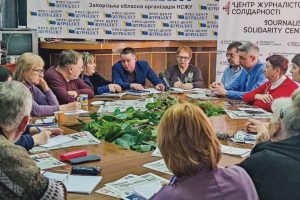
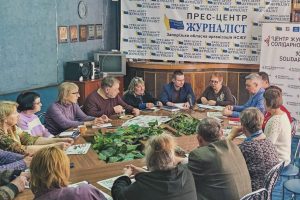
As earlier reported, the Journalists’ Solidarity Centers is an initiative of the NUJU implemented with the support of the International and European Federations of Journalists and UNESCO. The initiative is designated to help media representatives working in Ukraine during the war. The Centers operate in Kyiv, Lviv, Ivano-Frankivsk, Chernivtsi, Zaporizhzhia, and Dnipro and provide journalists with organizational, technical, legal, psychological, and other types of assistance.
UNESCO is the United Nations Educational, Scientific, and Cultural Organization. It contributes to peace and security by promoting international cooperation in education, sciences, culture, communication, and information. UNESCO promotes knowledge sharing and the free flow of ideas to accelerate mutual understanding. It is the coordinator of the UN Action Plan on the Safety of Journalists and the Issue of Impunity, which aims to create a free and safe environment for journalists and media workers, thus strengthening peace, democracy, and sustainable development worldwide. UNESCO is working closely with its partner organizations in Ukraine to provide support to journalists on the ground.
The designations employed and the presentation of material throughout this digest do not imply the expression of any opinion whatsoever on the part of UNESCO concerning the legal status of any country, territory, city, or area or its authorities or concerning the delimitation of its frontiers or boundaries.
The authors are responsible for the choice and the presentation of the facts contained in this digest and for the opinions expressed therein, which are not necessarily those of UNESCO and do not commit to the organization.
Nina Derkach, Nataliya Vadymova
Photo by Oleh Kosmin

 THE NATIONAL UNION OF
JOURNALISTS OF UKRAINE
THE NATIONAL UNION OF
JOURNALISTS OF UKRAINE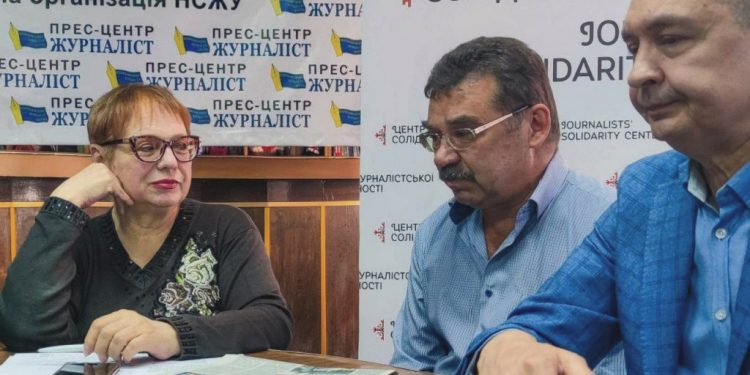
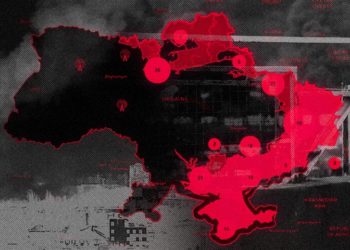
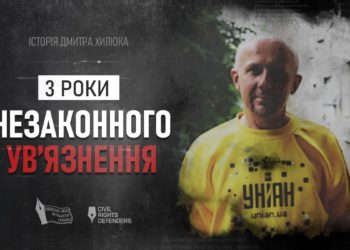














Discussion about this post